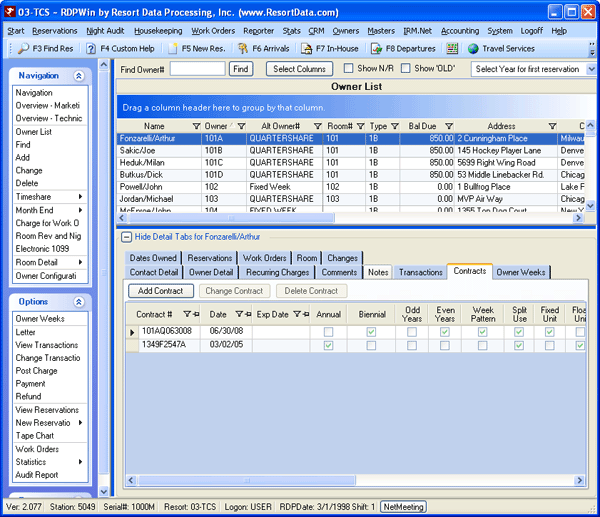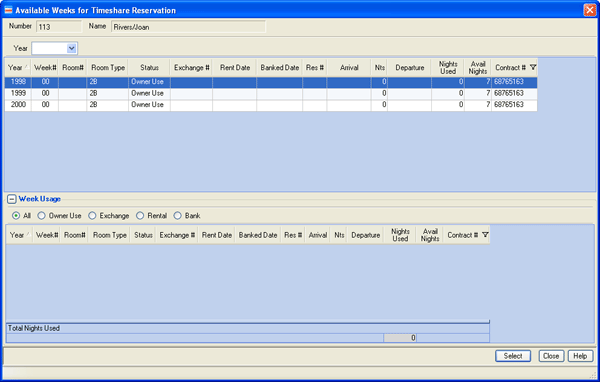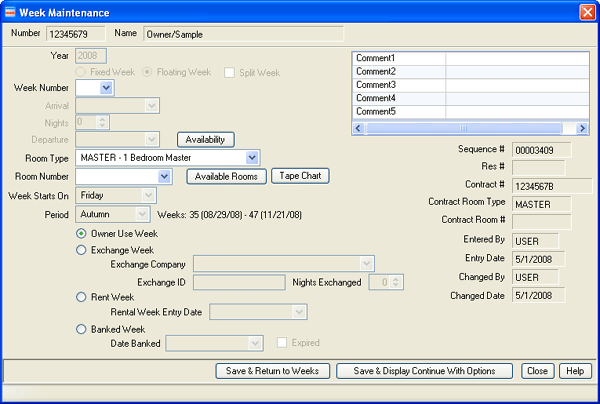Click here for Owner Navigation
Modules R3 Condominium Owner Accounting and R6 Timeshare & Interval Ownership are required.
|
Timeshare Topics |
|
|---|---|
|
Contract Property Process |
Non-contracts Property Process |
|---|---|
The R6 Timeshare & Interval Ownership module is required.
Overview
A timeshare is a form of ownership or right to the use of a property, or
the term used to describe such properties. These properties are typically
resort condominium units, in which multiple parties hold rights to use the
property, and each sharer is allotted a period of time (typically one week,
and almost always the same time every year) in which they may use the
property.
Timeshares can operate based on annual use (once each
year), biennial (every other year), week pattern (3-month interval ownership
with a rotating schedule), interval ownership (floating time and floating
weeks), and fractional (multiple week ownership at the same resort with two
or more weeks of timeshare ownership for use in one calendar year).
Rooms/units may be on a part-ownership or lease/"right to use" basis, in
which the sharer holds no claim to ownership of the property.
Methods of Use
Owners can:
- Use the week or contracted time;
- Rent the week/contracted time to someone else;
- Give as a gift'
- Exchange internally within the home resort or group;
- Exchange externally into thousands of other resorts using an exchange company.
Recently, with most point systems, owners may elect to:
- Assign usage time to the point system to be exchanged for airline tickets, hotels, travel packages, cruises, amusement park tickets;
- Rent part of their points without actually getting any usage time and use the rest of the points;
- Rent more points from either the internal exchange entity or another owner to get a larger unit or more vacation time or at a different location;
- Save or move points from one year to another.
Some developers limit which of these options are available at their
properties.
Aside from all the renting and point options, owners
can elect to stay at the resort during the prescribed period, which varies
depending on the nature of the ownership.
Ownership Types
- Deeded Ownership
- True property ownership with deed recorded in the county where the property exists. This type of property has the same rights of ownership accorded to it as other deeded real estate. The Owner is liable for the appropriate portion of real estate taxes, which are usually collected with condominium maintenance fees. The owner can sell, rent, bequeath, or give away the property.
- Fixed Week
- Fixed week properties assign an owner to a specific week for each calendar year, either by date or by calendar Weeks 1-52. Start day or check-in day can vary from Friday, Saturday, or Sunday. With a week number, the actual start date varies slightly from year to year. Unlike a floating week, an interval owner who owns a fixed week always vacations in the same week each year at their home resort such as the first week of June, the last week of the year, etc. A fixed week property assures that the owner always has the exact same season each year.
- Float Week
- Floating week owners do not own a specific week. Instead, float owners are assured a certain number of days (seven for each week owned) and can stay any time during the year on a first come, first serve basis. For example, each year the property opens the reservation calendar for reservations in October for the following year. The first owner to call and request a week for any week of the year is entitled to that week (based on room type and availability). Seasons (high or red, normal or white, and low or blue) are considered as well as room type ownership (one-bedroom, two-bedroom, studio, etc.).
- Fixed Unit/Room
- Fixed unit/room owners are entitled to a week in the same room each
calendar year. For example, Owner 101 owns Room 101 for Week 1.
Owner 101's reservation should be made for the first week of January in
Room 101.
Examples:
When the property is Fixed (Week) / Fixed (Room), the reservation should be made the first week of January in Room 101 every year (based on annual ownership).
When the property is Float (Week) / Fixed (Room), the reservation should be made when the owner calls to make the reservation (based on availability and season requirements) in Room 101 every year (based on annual ownership). - Float Unit/Room
- Float unit/room owners are entitled to a week in the same room type each calendar year. Float weeks always require a room type. Some properties may use outside of room type; however, the contract must always designated a room type for inventory purposes. For example, Owner 101 owns one week in a two-bedroom unit for Week 1. Owner 101's reservation should be made for the first week of January in an available two-bedroom unit.
- Examples:
When the property is Fixed (Week) / Float (Room), the reservation should be made the first week of January in an available room type that matches the room type purchased (two-bedroom) every year (based on annual ownership).
When the property is Float (Week) / Float (Room), the reservation should be made for the available, requested time period (based on availability and season requirements) in an available room type that matches the room type purchased (two-bedroom) every year (based on annual ownership). - Interval Calendar
- An interval calendar represents the 52 (and periodically 53 weeks) of each calendar year in 7-day increments shown Friday to Friday, Saturday to Saturday, or Sunday to Sunday, as related to a particular resort. Approximately every seven years, the calendar includes the additional 53rd week, which is typically reserved for developer/property use. A floating week owner may also elect to upgrade or downgrade to another season for whatever reason. Upgrading to a higher time division usually incurs an additional cost. The purchase at a fixed week property assures that the owners always has the same week each year; i.e., Week 52 or Week 35, etc. Alternatively, an owner of a floating week may choose another week within the allocated season.
- Odd and Even Usage (Biennial Ownership)
- Timeshare ownership usage every other year--some odd-numbered, some even. The ownership of this type of interval is valued at one-half the value of a full ownership property since the use is restricted to one-half of the annual usage. Reservations are made for the owner every two years for either the odd or even numbered years (fixed or float unit and fixed or float week must also be considered).
- Right To Use Ownership
- Right-to-use (RTU) occupancy rights for a specified number of years, with no ownership interest in the property. Some states and some foreign countries do not allow deeded ownership of timeshares. Alternatively, a lease ownership or Right-To-Use ownership grants the lessor the right to use the property for a specified period of time; usually from 20 to 99 years. The resort developer or Management Company holds ownership of the physical property. However, during the right-to-use period, the owner may rent, transfer, or bequeath the remaining years of their right-to-use property.
- Split Use
- Split use weeks are popular with owners who prefer shorter vacations, as the owner may split use of the interval into two or more separate visits to the resort, such as one three-night and one four-night stay at two different times of the year. Reservations are usually granted on a first come, first served basis and are based on availability; and properties typically only allow one Friday/Saturday night stay.
Contract Property Owner Reservation Process
- Add owners.
- Add contracts.
- An active contract creates the weeks based on timeshare property type and configuration. Use the Week Maintenance screen to update the week type (owner use, exchange, rental, banked). Any other changes such as the week number, dates, number of nights, room number, etc., must be changed on the actual reservation (Res# displayed for reference). These changes automatically update the week.
- Fixed/fixed property reservations are automatically created in RDPWin based on the contract information. All other types of properties (anything combination of floating rooms or weeks) must manually enter reservations based on the week created by the contract information.
- The cross-reference file is used for properties with rental programs and owner billing and is automatically maintained by the system based on the contract/week.
- Generate Weeks From Contracts (in the Owner/Timeshare submenu) should be used at the beginning of each year so existing contracts in the system get weeks added based on the new year.
The remaining steps of the process are fully automatic based on timeshare
property type:
| Floating Week, Floating Room Contracts | Floating Week, Fixed Room Contracts |
| Fixed Week, Floating Room Contracts | Fixed Week, Fixed Room Contracts |
Floating Week, Floating Room AND Floating Week, Fixed Room Contracts
Follow these basic steps to create a reservation for float/float and float/fixed contracts:
- To make a reservation, select Timeshare from the Reservations | New Reservations submenu.
- Find owner.
- Select the week from which the reservation is to be made from the
Week Usage section of the grid and click Select. Only weeks on
active contracts appear in the grid. Any
pending contracts must
first be changed to active before reservations can be made.

- Selecting the week accesses the Week Maintenance screen.
Select the Week Number and Room Number to make a reservation. The
Room Number is automatically selected for Floating Week, Fixed Room
contracts.

- When the owner does not wish to make a reservation, select either Exchange Week, Rent Week, or Banked Week radio buttons. This same information is accessible from the Weeks tab on the Owner Master record.
Fixed Week, Floating Room Contracts
Since the week number and room type exist on fixed week, floating
room contracts, the system automatically creates the week and makes an inventory
timeshare (Q) reservation. When the owner checks in or a room
number is assigned at any time, the Cross-Reference file is then
updated. To exchange, rent, or bank the week:
- Select Find from the Owner menu.
- Click the Owner Weeks tab.
- Select the week to be exchanged, rented, or banked; then click the Change Week button or double-click the week from the grid to access the Week Maintenance screen.
- Select either Exchange Week, Rent Week, or Banked Week radio buttons.
- Save & Close.
Fixed Week, Fixed Room Contracts
Since the week and room number bothexist on fixed week, fixed room contracts, the system automatically creates the week, makes a preassign timeshare (T) reservation, and updates the Cross-Reference file. To exchange, rent, or bank the week:- Select Find from the Owner menu.
- Click the Owner Weeks tab.
- Select the week to be exchanged, rented, or banked; then click the Change Week button or double-click the week from the grid to access the Week Maintenance screen.
- Select either Exchange Week, Rent Week, or Banked Week radio buttons.
- Save & Close.
Non-contract Property Owner Reservation Process
- Add owners.
- Add Weeks.
- Manually add the weeks.
- Manually create the reservations. This process is governed by the owner master and week information unless Switch 414-34 "Ignore Room Number Owned When Owner is Added to Cross-reference File" is checked.
- The cross-reference file is used for properties with rental programs and owner billing. Maintenance is automatic for fixed/fixed properties based on the contract/week. All other types of properties (anything combination of floating rooms or weeks) must manually maintain the cross-reference file, but only when the property operates with a rental program and/or owner billing.
04/05/2010
Click these links for Frequently Asked Questions or Troubleshooting assistance.
© 1983-2009 Resort Data Processing, Inc. All rights reserved.